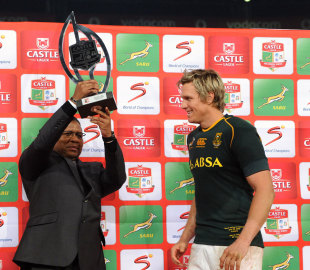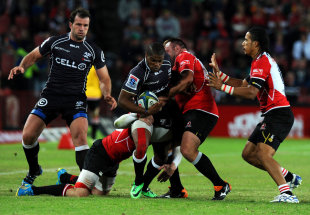|
South Africa
Changing colour in the Rainbow Nation
Firdose Moonda
April 18, 2014

The future is in the hands of the next generation, such as these fans at a recent Vodacom Cup match in Durban © Getty Images
Enlarge
South African Super rugby franchise, the Sharks, are fast-establishing themselves as the beacon of transformation as pressure mounts on rugby to change colour. The country's department of sport are on the verge of introducing a new quota which will affect rugby, cricket, netball and athletics and will require teams to field at least 60% non-white players or face being cut off from both government funding and international competition. Although the quota was due to implemented immediately, meetings between the federations and government over the last week have resulted in a short-term release of pressure. What has not changed is that the minister Fikile Mbalula wants to see action being taken soon in a bold case of suspected electioneering ahead of next month's national polls. Whether a political ploy or not, John Smit and Jake White appear have a head start. Three weeks ago in the Vodacom Cup the Sharks fielded six black players in their starting XV, exceeding the quota by one. Their Super Rugby side has wingers Lwazi Mvovo and Sibusiso Sithole playing out of position at fullback and outside centre respectively, decisions White has stuck with. They have also recalled another wing Tonderai Chavhanga to replace the injured Odwa Ndugane. All the players mentioned are black. An insider called this "not normal selection behaviour," and identified it as a mixture of commitment to transformation and a clear business decision. The first of those is obvious. The second, perhaps less so.

Sports minister Fikile Mbalula is trying to fast-track change
© Getty Images
Enlarge
Non-white South Africans make up the majority of the population and 84% of all people under 18 are black African. In years to come those people will become a massive market and the team that can capture their loyalty will reap benefits of their disposable income. As a result, sources say the commercial aspect of transformation could end up being the driving force behind the change officials are advocating which addressing the need to undo the moral and ethical reason wrongs caused by the country's segregated past. Although South Africa is celebrating twenty years of democracy in 2014, the Apartheid hangover in sport was revealed in a report compiled by the Eminent Person's Group (EPG). The committee was appointed in 2012 to investigate transformation in South African sport. In order to understand their findings, you first have to understand the ministry's definition of black which is split in two ways: "generic black" refers to anyone who is not white and "black African" is not explicitly explained but that encompasses the group of people who can trace their ethnic roots exclusively to Southern Africa. If a team contains 50% generic black players they are deemed 100% transformed by the EPG. The body also had additional criteria for black Africans which affect the transformation score with anything over 70% rated as good and anything below as poor. Overall, rugby was found to have a 78% success rate in the generic black category, however at Springbok level that drops to 45%. They are also rated 34% overall in the black African category. At provincial level, their transformation is rated at 60% for generic black and only 30% for black African. The EPG's report considered the Springboks to be "lagging behind," in transformation terms, especially when compared with the national cricket team (the other traditionally white dominated team sport in South Africa) and said "special intervention may be required in order to strengthen its long-term human capital base." At provincial level, it said there was need for "increased focus on provincial performances." SARU have already tried to address the provincial challenge themselves. Last August they announced targets for this season Vodacom Cup, the second-tier domestic competition, which required all 14 teams to pick at least seven generic black players in their match-day 22s, of which at least five were required to start. Of those, two had to be forwards. Their intention in introducing the new targets was to have an "increased pool of black talent from which Currie Cup and Super Rugby coaches can select," according to a press release, and to avoid a situation like the one faced by Andile Jho. The black African centre was schooled at the prestiguous Dale College in King Williams Town in the Eastern Cape, the alma mater of Bjorn Basson and Keegan Daniel. He played for the 2009 South African Schools team and was recruited by the Bulls the following year. In his two years at the franchise, he got only 118 minutes of game time and grew increasingly frustrated with what he saw as marginalisation. In a news insert with the eNews channel in 2012, journalist Simnikwe Xabanisa explained Jho's bench time as follows: "If you find two players of a similar ability, the coach will probably go with the white guy, because the is someone whose buttons he knows how to work with. With a black player, he will first have to get to know him and which buttons to push." Jho moved back to the Eastern Cape and joined the Kings in 2013. He is now part of their Vodacom Cup squad. The competition has one more round to play before the knockouts and the so-called quota players have not just been making up the numbers. The top try scorer is Western Province's Devon Williams, a mixed-race player.

Sibusiso Sithole of the Sharks, a side leading the way in South African professional rugby
© Getty Images
Enlarge
Whether Jho or Williams or a player in that vein goes on to play Super Rugby or for the Springboks will ultimately be the measure of whether transformation is working but there are numerous other address beyond that. Development rugby is seen as the major cause of the lack of transformation, even though there is evidence of interest and participation among non-white communities in rugby throughout the country, particularly in the Eastern Cape. The EPG report had insufficient data from schools but from what they had obtained they reported less than one rugby, cricket and football facility in primary and secondary schools around the country. Development at grassroots level must improve. Perhaps more tellingly, the EPG noted most non-white players fall through the cracks when boys become men. "The causes for the large dropout, among particularly cricket and rugby players after school, requires more attention," it read. That is ultimately where the solution to the quotas lie. They need not be introduced at national or even the higher levels of provincial rugby but simply at the level where sport becomes professional. That will allow that young non-white players to have an income-earning opportunity so that they will not walk away from the game in search of a job just as they are starting to show promise. That way, the moral, ethical and commercial aspects of change can all be achieved. © ESPN Sports Media Ltd Firdose Moonda is a freelance journalist working in South Africa
|
Live Sports
Communication error please reload the page.
-
Football
-
Cricket
-
Rugby
-
- Days
- Hrs
- Mins
- Secs
F1 - Abu Dhabi GP
Abu Dhabi Grand Prix December 11-131. Max Verstappen ()
2. Valtteri Bottas (Mercedes)
3. Lewis Hamilton (Mercedes)
4. Alexander Albon ()
5. Lando Norris ()
6. Carlos Sainz Jr ()
-
ESPNOtherLive >>
Golf - Houston Open
Snooker - China Open
Tennis - Miami Open

